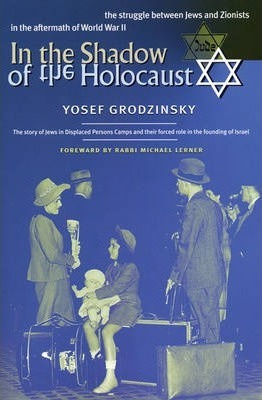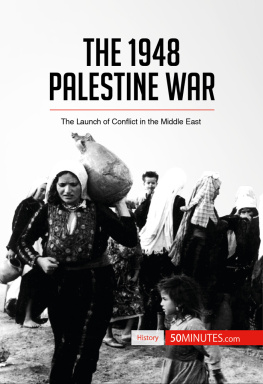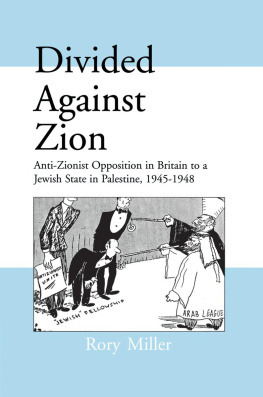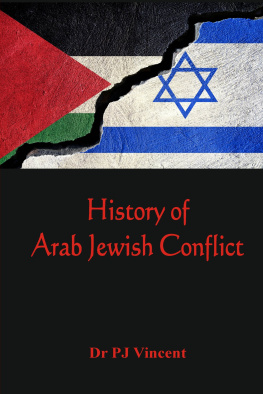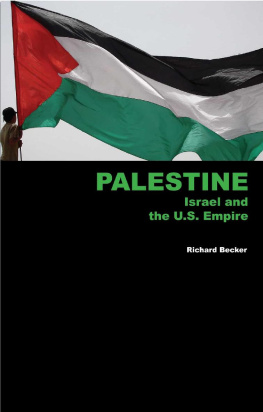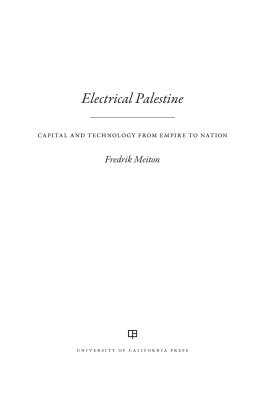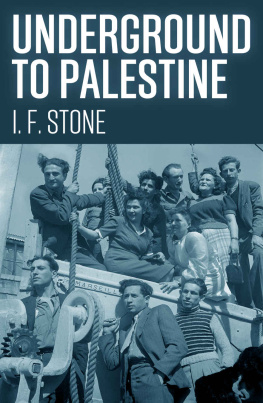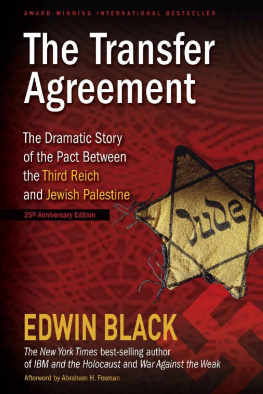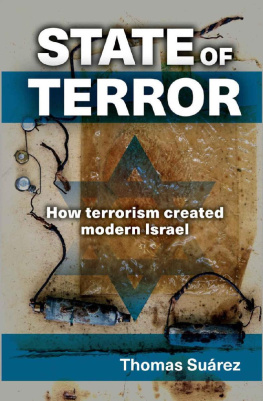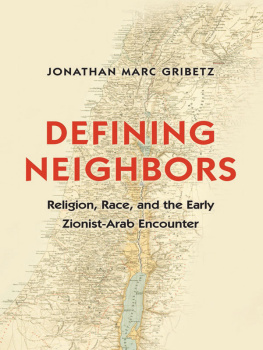In the Shadow
of the
Holocaust
The Struggle Between Jews and Zionists in the Aftermath of World War II
Yosef Grodzinsky
Common Courage Press
Monroe, Maine
Copyright 2004 by Yosef Grodzinsky
All rights reserved.
Cover design by BSO
Front cover photo: Jewish immigrants in New York, 1948. Courtesy of the Diaspora Museum, Tel Aviv.
Back cover photo: A Palestine immigration certificate issued by the Warsaw office of the Jewish Agency in 1938 to the author's father, that enabled his pre-war departure from Poland.
ISBN: 1 -56751-278-x paper
ISBN: 1-56751-279-8 cloth
Library of Congress Cataloging-in-Publication Data is available on request from the publisher
Common Courage Press 121 Red Bam Road
Monroe, ME 04951
800-497-3207
FAX (207) 525-3068
See our website for e versions of this book.
www.commoncouragepress.com
First Printing
Printed in Canada
In memory of my grandfather', Yosef Grodzinsky, and my grandmother, Reyzl Grodzinsky (nee Kretchmer) who did not even reach a DP camp
Contents
by Rabbi Michael Lerner
The Potsdam Declaration and the
The Misery of Millions: Refugees and Displaced Persons 24
The Childrens Journey to the Promised Land Begins 49
Populating Strategies: A Hierarchy of Jewish Weakness 215
Foreword
Yosef Grodzinsky has an important story to tell. And it is a story that will make many aware of the deeply flawed nature of the Zionist movement in the 1940s.
Zionism did not have the support of a majority of Jews before the Holocaust. But even after the genocide of millions of our people, the Zionist movement had ambiguous support. Though most of us were taught that the survivors of the Holocaust, living in Displaced Persons Camps, were hungering to get to the Land of Israel where they could start a new life, it turns out that while most of these survivors supported the creation of a Jewish state, most of them did not choose to live in such a state. Many Zionist activists, on the other hand, thought they knew better what would be in the best interests of the survivors, and so the Zionists manipulated and sometimes coerced these survivors into coming to Palestine and serving in the army that was being developed to fight for national self-determination and the creation of a Jewish state. From the standpoint of many of the Zionists sent to deal with the displaced persons camps, the survivors were part of a larger Diasporic irrationality that still, even after the Holocaust, could not see that Jews would be in danger everywhere unless they had their own state. Rather than treating them as whole human beings who had every right to make their own choices, the Zionist activists saw them as severely lacking in the capacity for rational judgment, and hence in need of the benevolent assistance of those who had been smart enough to get out of Europe long before the anti-Semitic virus had taken hold.
Zionism is not the only movement which has had moments in which it cannot recognize the humanity of the people whom it hopes to liberateand not necessarily the worst. The long history of social change movements, from the labor movement to the socialist and communist movements, presents us with many similar tales of zealous activists who coerce, manipulate and disrespect the very people whose interests they claim to represent. And the same story can be told in other places as wellthe welfare workers and teachers and government workers who go into civic work in order to be of service to others but who eventually end up acting in disrespectful and coercive ways to the constituencies that they had hoped to serve; the feminists who find themselves under attack from other women who believe that the activists are trying to impose an agenda that is disrespectful to their lives as mothers and wives in building strong families; the liberators of Iraq who think that they know best how to save the population from Saddam Hussein and end up engaged in a war of occupation against the population they came to save.
The flawed nature of Zionism is not a sufficient reason to discard its fundamental vision that the Jewish people deserve a nation state like every other nation. But being a nation like every other nation becomes increasingly problematic in a world in which nation states themselves are increasingly in danger of becoming the major obstacle to developing ecologically sound and social-justice respecting approaches that could save the world from impending environmental disaster. If the messianic vision that nation shall not lift up sword against nation seems increasingly impossible to imagine, then it may be necessary to begin to imagine a world that has made nation states irrelevant. But as long as nation states persist, we have a duty to hold them responsible to treat human beings in the most generous and respectful way possible.
Many of us who love Israel have become increasingly despairing that its current government could ever come close to embodying the basic respect for human rights of the Palestinian people that the world rightly demands of a state that claims to be part of the family of nations. We know that Israel has lost its way and needs a fundamental transformation. There are others, however, who will argue that Israel was always filled with an arrogance and insensitivity that was core to the Zionist enterprise.
For them, Yosef Grodzinskys book will provide vital confirmation, showing that this arrogance was there even before it was directed at Palestinianswhen it manifested in an insensitivity to the needs of the survivors of the Holocaust. For me and for others, Grodzinskys work reconfirms a basic understanding that human life is deeply flawed, and badly in need of the healing and repair that we call tikkuna healing that is both political, psychological and spiritual. May this book contribute to people getting off their high horses, recognizing our common flaws, and moving toward the creation of a movement for genuine tikkun among the Jewish people, and among all peoples.
Rabbi Michael Lerner Editor, Tikkun Magazine
Dramatis Personae (lead roles)
DPs
Moshe AjzenbudJournalist, Bundist newspapers, American Zone
Jakob CelnikArt teacher, Camp Nei Freimann
Yitzhak ElsterCamp Styer, Austria
Dr. Zalman GrinbergChairman, Z.K., American Zone
Dr. Shmuel GringauzPresident, Z.K., American Zone
Chava RosenfarbCamp Bergen-Belsen
Yosef RosensaftPresident, Z.K., British Zone
David TregerMember of Prezidium, Z.K., American Zone
Allied officers and commanders
Gen. Dwight D. EisenhowerAllied Supreme Commander in Europe, 1945
Gen. Joseph T. McNarney, US ArmyAllied Supreme Commander in Europe, 1946-1947
Gen. Lucius D. Clay, US ArmyCommander in Chief, US Occupation Force in Germany, 1947-1949
Major Irving Heymont, US ArmyCommander, Camp Landsberg, 1945
Major Abraham Hyman, US ArmyDeputy Advisor on Jewish
Affairs, 1945-1951
Jewish-American activists
Professor William HaberAdvisor on Jewish Affairs, 1948
Judge Simon RifkindAdvisor on Jewish Affairs, 1945
Zionist envoys in Europe
Shalom Adler-RudelJewish Agency
Shaul Avigur (Meirov)Head, Mossad
Col. Yehuda Ben-DavidDeputy Commander, Haganah
European Theater
Dr. Chayim Hoffmann (Yahil)Head of Jewish Agency Delegation, Munich
Capt. Aharon Khoter-YishaiThe Jewish Brigade, Royal British Army
Zeev Schind (alias Danny) Mossad
Brig. Gen. Nahum ShadmiCommander, Haganah European Theater
Next page
